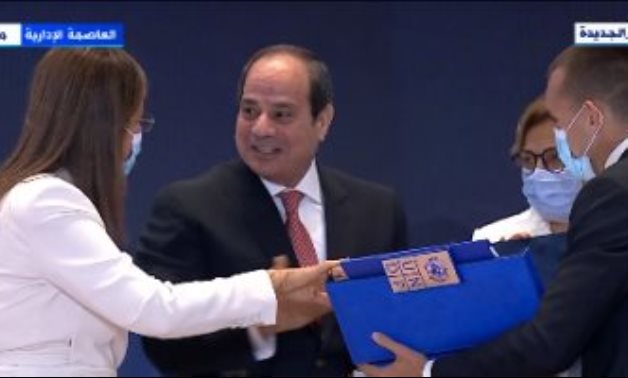
President Abdel Fatah al-Sisi while handed the UN Human Development Report on Egypt for the period 2011/2021 on September 14, 2021. TV screenshot
CAIRO – 14 September 2021: A ceremony was held Tuesday at the New Administrative Capital to celebrate the issuance of the UN Human Development Report delineating the performance of Egypt on that front over the period from 2011 and 2021.
President Abdel Fatah al-Sisi was handed the report, titled "Development: A Right for All, Egypt’s Pathways and Prospects," by both Minister of Planning and Economic Development Hala al-Said, and UNDP Resident Representative Randa Abou El Hosn.
Abou El Hosn said that the audacious economic reform program Egypt has embarked on, tackled areas that have never been dealt with before. She added that the impact of Egypt’s development endeavors is most seen in the sectors of education, healthcare, and housing.
The UNDP resident representative also commended the legal reforms undertaken by Egypt to empower women and eliminate violence against them. Examples include toughening the penalties of FGM, and increasing their percentage in leading positions.
In a pre-recorded video, UNDP Administrators Achim Steiner stated that evaluation is underway to provide Egypt with the necessary financing to continue its development plans aimed at fulfilling Development Vision 2030. The international official asserted that UNDP looks forward to a more sustainable, and green future.
Further, UN Resident Coordinator in Egypt Elena Panova delivered a speech saying that the 2021 report is the first since 2010 so it covers all changes over the past decade.
Panova noted that Egypt’s immediate response to COVID-19 crisis served the most vulnerable citizens, refugees, and maintained the outcomes of the economic reform program.
"There is a pressing need to accelerate the accomplishment of 2030 SDGs globally, particularly the eradication of poverty, which will be achieved through human development," the UN Resident Coordinator in Egypt stressed.
Minister of Planning and Economic Reform Hala al-Said showcased that the measures taken to achieve economic development began seven years ago following a period that imposed challenges to the fulfillment of such goal.
The main challenges to development in Egypt are climate change and overpopulation, the minister of planning underlined. Commenting on the report, the minister noted "it is a documentation of the amount of effort deployed in light of non-ideal circumstances."
Addressing the same point, Prime Minister Mostafa Madbouli asserted that "the outcomes highlighted in the report prove Egypt’s success in overcoming many challenges."
The prime minister highlighted that the healthcare sector has been the most to reap the fruits of investment in human development. He pointed out to initiatives such as 100 Million Healthy Lives Campaign, and the presidential campaign for women’s health.
UNDP officials presented some of the figures and facts included in the report noting that Egypt became one of the top countries in in human development.
Speaking of education, the rate of dropping out of schools declined while the rate of enrollment rose. As for healthcare, the provision of hepatitis C treatment has been the flagship initiative along with “100 Million Healthy Lives” Campaign.
With regard to decent housing, Egypt achieved milestones by offering alternative housing to slum dwellers, and social housing for low-income citizens.
On the other hand, the GNI per capita declined by more than three percent between FY2016-17, when economic reforms started, and FY2020/21. However, it is projected to grow by 1.7% in the coming four years as GNI is estimated to record 4.7% per annum.
In the same context of income, poverty rates have fallen from 32% to 29.7% since 2016. The UN officials highlighted that poverty is more prevalent among large families.
Regarding social safety, the coverage of social insurance dropped from 61% for females and 67% for males in 1998 to around 30% for both now. Also, the coverage of medical insurance remains low.
Nevertheless, Egypt’s measures to protect the most vulnerable from the impact of COVID-19, ranked on top in the MENA region by the United Nations.
What's more, Egypt showed mixed indicators about governance as some are high while others are low. For instance, the indicator of infrastructure, in spite of the huge investments Egypt had injected in that sector, is still average, given that many countries is investing in infrastructure either.
The president pledged to enhance the lives of 58 million citizens living in rural areas describing the figures in the report as "transparent and credible."
Comments
Leave a Comment